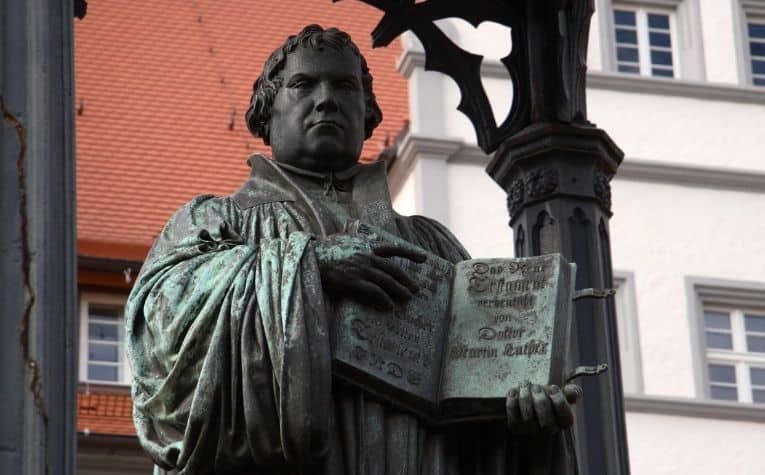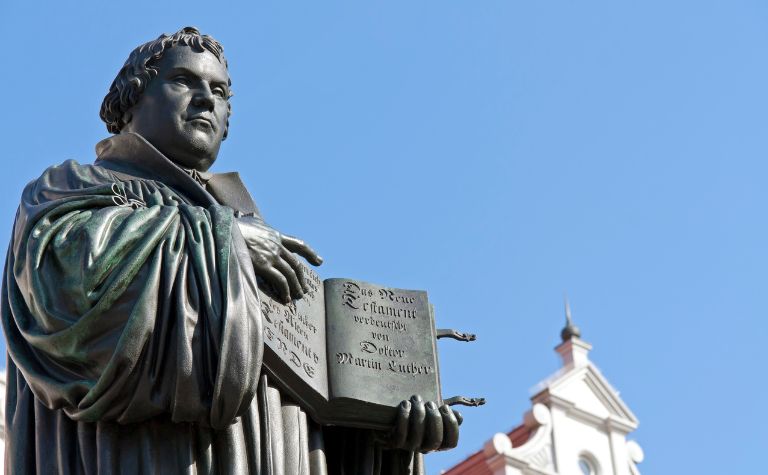For over 500 years, the Lutheran branch of the Christian faith has established churches and influenced the world with strong doctrinal convictions. Predestination is an essential theological doctrine in many denominations and churches, so what does Lutheranism teach about it?
The Lutheran tradition believes in predestination but not in the same way Presbyterian, Reformed, or Calvinist theologies do. Martin Luther, Lutheran confessions, and modern Lutheran teachings sometimes articulate the doctrine of predestination in ways that make it difficult to align them.
What did Martin Luther (1483-1546) teach about predestination? How was it different than what John Calvin (1509-1564) taught about it? Why have Lutherans sometimes disagreed about the doctrine? Keep reading to learn more.

Are Lutherans Calvinists?
The Bible mentions the word “predestination” in multiple verses (e.g., Rom. 8:29, Eph. 1:5). Therefore, it’s not a matter of if Lutheranism believes in predestination but what it believes about it.
Calvinists, Arminians, Lutherans, Baptists, and all other Christians “believe in” predestination because it’s taught in Scripture. (Also see Are Lutherans Born Again?) Please note: In this article, the terms “Reformed” and “Calvinism” will be used interchangeably.
Lutherans aren’t Calvinists because their theology isn’t compatible with Reformed doctrines, including predestination. People often summarize Calvinism with the T.U.L.I.P. acronym,
- Total depravity
- Unconditional election
- Limited atonement
- Irresistible grace
- Perseverance of the saints
The historic Lutheran confessions, and modern Lutheran teachings, are either 2, 2.5, or 3-point Calvinists, depending on how terms are defined.
Yet many would question describing Lutherans as half-committed Calvinists, including this writer, “The wrong thing to conclude from this evidence is that Lutherans are hesitant Calvinists, or two-and-a-half-point Calvinists, or imperfect Arminians. Lutherans are Lutherans. Their theological frame of reference is not closely related to the Calvinist-Arminian continuum.” [1]
What different Christian traditions believe about “predestination” can be worlds apart. Such differences have divided denominations, churches, and families.
In some traditions, predestination is peripheral to their primary theological convictions, yet to others, it’s central. As a result, predestination is one of the most divisive topics in the history of Christianity.
When the word “predestination” is used without a qualifier, as in, “Do you believe in predestination?” or “Do Lutherans believe in predestination?” the question often assumes the Calvinist understanding of the term.
This assumption occurs because the doctrine of predestination is a central tenet of the Reformed tradition’s theological system.
When people understand the terms according to Lutheranism definitions, the answer is yes, Lutherans believe in predestination, and no, they aren’t Calvinists. (Also see Do Lutherans Believe You Can Lose Your Salvation?)

Predestination in Lutheranism
The Lutheran concept of predestination disagrees with the Reformed or Arminian understanding of the doctrine. Lutheranism doesn’t believe in predestination like Reformed or Arminian Christians do. Lutheranism represents a third way of understanding predestination. (Also see Lutheran vs. Baptist: What’s the Difference?)
Because Lutheranism’s beliefs about predestination represent a third way, some people see it as the rope in a tug-of-war between Calvinism and Arminianism.
Depending on what aspect of predestination a person assesses, some argue the Lutheran view leans Reformed, while others hold it’s more like Arminian. Many Lutherans would say it doesn’t “lean’ toward either; instead, it stands alone. (Also see Lutheran vs. Non-Denominational: What’s the Difference?)
Do Lutherans Believe In Divine Election?
Classic Lutheran theology teaches that God’s election of people for salvation doesn’t come from any merit in the individual.
Instead, some believe God’s election comes from His will, aspects of which will always be a mystery to people, while others argue that it’s a result of people choosing to seek Him.
| Tradition | Election |
|---|---|
| Lutheranism | God unconditionally elects people to salvation. Election isn’t based on God’s foresight of who would choose Him. Lutheranism doesn’t believe in reprobation (i.e double predestination); meaning, God doesn’t choose not to save certain people. |
| Calvinism | God unconditionally elects people to salvation and passes over others. Election isn’t based on God’s foresight of who would choose Him. Calvinism believes in reprobation, meaning God chooses not to save certain people.* |
| Arminianism | God conditionally elects people to salvation comes from foreseeing that they would respond to the Gospel and remain committed to Him. Arminianism doesn’t believe in reprobation. |
* Calvin writes, “We assert that by an eternal and immutable counsel, God has once for all determined both whom he would admit to salvation and whom he would condemn to destruction” (Institutes 3.21.7). [3]
Lutheran theology argues against reprobation, also called “double predestination,” which holds that God has elected some to salvation and chosen others for damnation. (Also see Lutheran vs. Episcopalian: What’s the Difference?)
Lutheran theology emphasizes that salvation doesn’t come from God’s election but from the atoning work of Jesus Christ on the cross and his subsequent resurrection from the dead. Reformed thinkers agree with this; however, some Lutheran thinkers believe they don’t stress it enough.

Was Martin Luther a Calvinist?
What is the challenge of understanding predestination in Lutheranism? Many Lutherans — not just non-Lutherans — acknowledge that sometimes Luther himself, certain historic Lutheran confessions, and modern Lutheran teachings have different positions on predestination.
One Lutheran write states, “It must be noted that Luther’s opinions are not necessarily the opinions of his spiritual descendants.” [2]
The fact is, not even Lutheran pastors and theologians agree with what Luther himself believed about it. Some suggest his book Bondage of the Will argues for predestination in a way that many Reformed thinkers do. One Reformed theologian writes, “Luther affirmed both election and reprobation in the strongest terms.” [4] (Also see What Bible Translation Do Lutherans Use?)
Others point to sermons he gave in which he argues against the Reformed idea of the concept.
For example, in a sermon on Genesis, Luther said, “I hear that here and there among the nobles and persons of importance vicious statements are being spread abroad concerning predestination or God’s foreknowledge. For this is what they say: ‘If I am predestined, I shall be saved, whether I do good or evil. If I am not predestined, I shall be condemned regardless of my works…”
Luther continues, “If the statements are true, as they, of course, think, then the incarnation of the Son of God, His suffering and resurrection, and all that He did for the salvation of the world are done away with completely. What will the prophets and all Holy Scripture help? What will the sacraments help?” [2]
Disagreements Among Lutherans
Whether modern Lutheran theologies, historic Lutheran confessions, and Luther himself agreed or disagreed about predestination is a matter of debate. Some believe they teach differently. Others say they emphasize different aspects. (Also see What Do Lutherans Believe About Mary?)
Historic confessions: Confessions, like the Augsburg Confession, are essential to Lutheran history. It’s argued that some Lutheran confessions describe predestination that reflects Reformed theology, while others discuss it in a way that doesn’t. The debate among Lutheran theologians then turns into what confession is better.
Modern teachings: In conservative, orthodox Lutheran theologies today, most theologians describe their beliefs on predestination as a third way and reject the theological systems of Calvinism and Arminianism. (Also see What’s the Most Conservative Lutheran Synod?)
Modern Lutheran Views on Predestination
Conservative modern Lutheran holds these ideas in tension: Jesus died for the whole world (John 3:16), and God wants to save all people (2 Pet. 3:9). Yet, not all people will be saved (e.g., Matt. 25:41).
One writer states, “We are willing to accept the seeming paradox, that an almighty God who predestines believers to be saved and who earnestly desires the salvation of all nevertheless will see some not saved.” [2]
For many people, the challenge of understanding the Lutheran doctrine of predestination is threefold:
- They have assumptions rooted in Reformed theology
- There are tensions in conventionally accepted theological systems
- Sometimes it’s challenging to align historical teachings on the topic with each other
Sometimes it’s easier to understand what Lutheranism doesn’t believe about predestination than it is to understand what it does believe.
Martin Luther, in Preface to the New Testament, wrote, “The gospel demands faith in Christ: that He has overcome for us sin, death, and hell, and thus gives us righteousness, life, and salvation not through our works, but through His own works, death, and suffering, in order that we may avail ourselves of His death and victory as though we have done it ourselves.”
References:
[1] Source
[2] Source
[3] Source
[4] The Christian Faith. Michael Horton. p. 314.
Related Questions
The Lutheran and Episcopalian traditions have profoundly impacted Protestant Christianity in Europe, the United States, and worldwide. Yet, these two branches of the Christian faith have similarities...
The Lutheran tradition is a 500-year-old branch of Protestant Christianity. Non-denominational churches are a fast-growing segment of evangelical Christianity, especially in the United States and...
